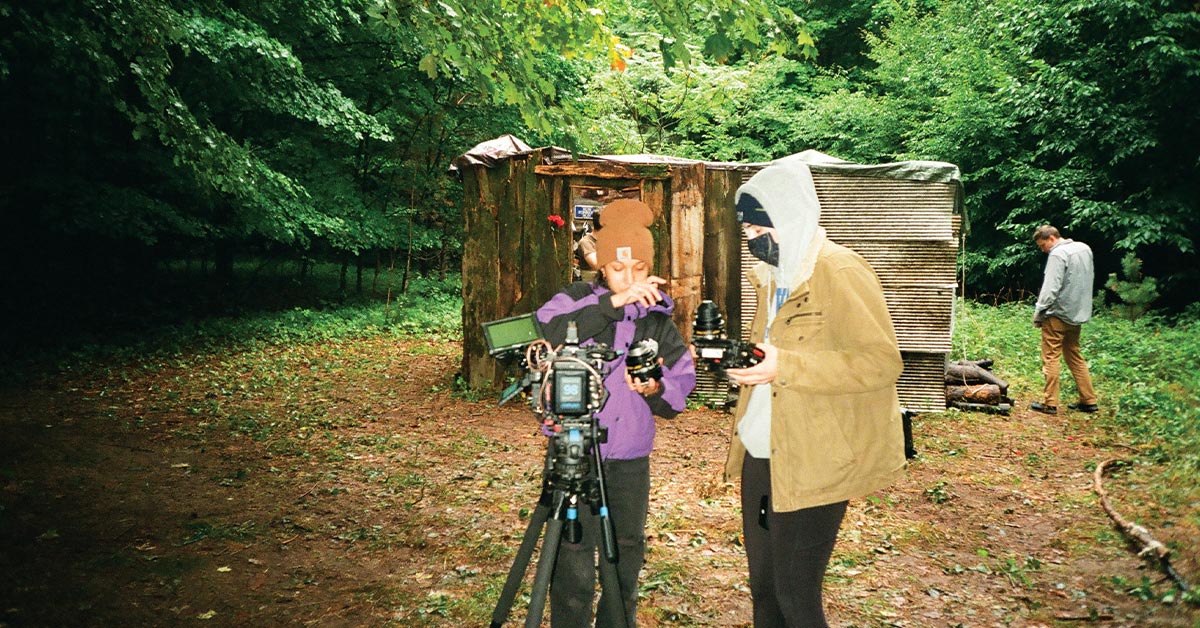For Matt Everitt, watching movies isn’t enough—he has to make them. His latest short film, You Can Go Home Whenever You Want, has earned acclaim at film festivals from Ohio to Italy.
Brought to life in West Michigan by a local crew on a crowd-funded budget, Everitt’s film features SAG actors cast by PR Casting—a two-time Emmy-winning firm based in Chicago. Viewers can now find Everitt’s film on Omeleto, an established YouTube channel for independent shorts with nearly four million subscribers.
Beyond bringing Hollywood-level productions to our own backyard, Everitt has helped cultivate a community of local cinephiles through the Grand Rapids Film Society, a public group in partnership with the Grand Rapids Community Media Center.
Tell us about your latest short film.
You Can Go Home Whenever You Want is the story of a man who watches over a hill that people go to when they’re ready to leave this world. He lives a monk-like existence on the hill where he’s very disciplined and regimented, and then that’s disrupted when he’s visited by an old friend from high school. The question of the film is: can they set aside their own prior beliefs long enough to find the comfort that they’ve both been looking for?
The plotline is quite existential. What intrigues you about this style of storytelling?
This film was an exercise in my own empathy with people whose lifestyle or life choices didn’t make sense to me. A lot of people initially see it as a film about ending your life or depression, and while those are absolutely facets of it, I didn’t make a story about the people going to the hill. I made a story about the person who sits with the people going to the hill.
I don’t think I’m capable of making anything that’s not existential because I get bored. I’ve written horror scripts, I’ve tried to write straightforward things, and I just get too bored to finish them.
What’s something about your film that viewers wouldn’t know just by watching it?
The film’s score was written by Dan Deacon, who is an incredible musician in his own right. I had originally written my high school band’s shitty demo into the script, and so the song that the characters are jamming to in the film is my actual high school band. Dan had the idea of using the chord progression from my demo as the backbone of the score, so whenever you hear the music and the themes that he’s built, they are all variations of what we wrote in high school.
How did this project grow you as an artist?
Early on, I fell into the trap of thinking I could do it all myself, or that I didn’t want to ask people to be part of my little project and have my shameful directing skills on display. There was this mix of ego, but also false humility, and that really held me back.
For this film, instead of doing two or three drafts of the script, I did nine drafts of the script. When we were on set and someone presented something that I thought was good, I let my curiosity go, “but what if it was better?” That was the biggest shift.
You’ve invested a lot of your time back into the local scene, specifically with the Grand Rapids Film Society. Can you tell us more about this?
The Grand Rapids Film Society is a recent addition to the Community Media Center. The Community Media Center has been doing incredible work for years, giving people access to cameras, editing tools. You can approach them with a lot of ideas and they’ll give you the resources to make it happen. They’ve laid the foundation for everything that we’re doing, and what we’ve done from the Film Society perspective is, come in with a more direct approach for different areas.
What are some events you’ve developed with the GRFS?
We have the Filmmaker Round Table event, which allows people from all over to network and see what’s up with the filmmakers here in town. From there, there’s Pitch Night, where anybody who’s written a script and wants to share it with the community can practice pitching in front of a group, and anybody who’s there can sign up to support and participate in that project going forward. Once you get your film made, we have Rough Cut Night, where we open up the smaller theater at Wealthy Theatre, and you can screen anything that’s not done yet. This really pushes people to think of the theatrical experience, rather than just throwing it on YouTube and calling it good.
What’s it like being a filmmaker in Grand Rapids?
Making movies in Grand Rapids is the best, because we don’t have to prove anything to anyone. There are a few people in town who talk about bringing Hollywood to Grand Rapids. A lot of people think we all want that, but there are some connotations with Hollywood coming here, whether it’s culturally, socially, financially.
For me with my film, it was more about showing what’s happening here, regardless. It’s the power of a cold email. I didn’t know the casting director, I didn’t know the composer, before I emailed them. In Grand Rapids, we get to invite people from across the country to join in on these projects that are unique, and they find meaning in it, which is the coolest thing on earth. We don’t need Hollywood coming here anymore. We’re already doing it.





